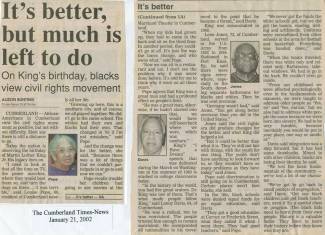Collection Name
About
It's better, but much is left to do
On King's birthday, blacks view civil rights movement
ALISON BUNTING
Times-News Staff Writer
CUMBERLAND —
African Americans in Cumberland view the civil rights movement as positive, but not without difficulty. Most say there is still a distance to go.
Today the nation is observing the birthday of Martin Luther King Jr. His legacy lives on.
"I used to look at that all the time on TV, the peace marches, where they would beat them so, and turn the dogs on them ... it was terrible," said Louise Pope, 80, resident of Cumberland nearly all her life.
"Growing up here, this is a southern city, and of course, we all played together. We didn't go to the same school. The whites had their own and blacks had their own. That changed in '65 if I'm not mistaken," said Pope. And the change was for the better, she said, "Because there was a lot of things that we couldn't participate in or go to and now we can." Pope recalls trouble her children had going to see movies at the Maryland Theater in Cumberland.
"When my kids had grown up, they had to come in the back and sit on the third floor. In another period, they couldn't go at all. It's just the way the times change, and who owns what," said Pope.
"Now we can sit in a restaurant and eat. I don't see the problem why it was never done before. It's odd for me to think why it went on all those years."
Pope agrees that King was a great man and had a profound effect on people's lives.
"He was a great man, otherwise, if he hadn't started into that, we would have still been back where we were, which was nowhere." King's "I Have a Dream" speech that was delivered during the March on Washington in the summer of 1963 is studied in college classrooms today.
"In the history of the world, you had five great orators. Dr. King was one of them. That's what made people follow King," said Lonny Davis, 64, of Cumberland.
"He was a radical, but he was nonviolent. The people trusted him enough to remain nonviolent. He incorporated all nationalities in his movement to the point that he became a threat," said Davis.
King was assassinated in 1968.
Leon Jones, 73, of Cumberland, served in the U.S. Army from 1952 to 1954. Stationed in Fort Knox, Ky, he said there were signs everywhere, especially in the South, denoting separate bathrooms for blacks and whites. Then he was sent overseas.
"Germany wasn't bad," said Jones. "You got along better overseas than you did in the United States."
Jones said the civil rights era did produce changes for the better, and what King did helped a lot.
"But it could be better than what it is. They're still not fair with things, with the youth for one thing. The youth don't have anything to look forward to, or they wouldn't have as many problems as they have today," said Jones.
Pope said discrimination is still going on in Cumberland. Certain places won't hire blacks, she said.
In the '40s, black schools were denied equal funds for an equal education, said Davis.
"They got a good education at Carver, or Frederick Street, what they called it when I went there. They had good teachers," said Pope.
"We never got the funds the white schools got, but we did get the basics, reading, writing and arithmetic. Uniforms were secondhand from other schools in the area for football and basketball. Everything was handed down," said Davis.
"When the teams traveled, there was white only and colored only. Bathrooms, takeout windows. We had to go in the back. We couldn't even go inside.
"From our childhood we were affected psychologically, even in the fundamentals of manners, we were taught to address older people as 'Yes, sir' and 'Yes, ma'am,' but we also had to address white people the same because we were born into slavery. We had to be very humble, because inevitably you would be put in your place, one way or another."
Davis said integration was a step forward, but it has had some drawbacks. Mixed in with other children, blacks are losing their identity, he said.
"We lost the basic fundamentals of the community — we've lost a lot of our character.
"We've got to go back to small pockets of segregation," said Davis. "Get our black children and get black teachers, even if it's a special class or program. The black kids need to learn from their own people. History is a valuable factor. They have to learn their history before they know who they are.
